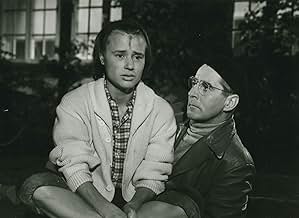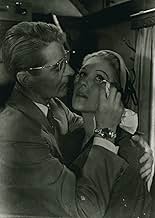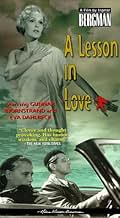IMDb RATING
7.0/10
3.9K
YOUR RATING
After a 15-year marriage, the spouses are going to divorce, but suddenly find out that their feelings have not vanished yet.After a 15-year marriage, the spouses are going to divorce, but suddenly find out that their feelings have not vanished yet.After a 15-year marriage, the spouses are going to divorce, but suddenly find out that their feelings have not vanished yet.
Birgitte Reimer
- Lise
- (as Birgitte Reimers)
Georg Adelly
- Bartender
- (uncredited)
Ingmar Bergman
- Narrator
- (uncredited)
- …
Julie Bernby
- Guest at Wedding
- (uncredited)
Henning Blanck
- Guest at Wedding
- (uncredited)
Tor Borong
- Gentleman
- (uncredited)
Yvonne Brosset
- Dancer in Bar
- (uncredited)
Olle Ekbladh
- Guest at Wedding
- (uncredited)
- Director
- Writer
- All cast & crew
- Production, box office & more at IMDbPro
Featured reviews
"A Lesson in Love" was, at least to some extent, an exception in Ingmar Bergman's production which reached its breakthrough one year later with "Smiles of a Summer Night". Then continued with such masterpieces as "The Seventh Seal" and "Wild Strawberries". However, even if "A Lesson in Love" wasn't the film which defined Bergman, it is still very enjoyable, witty and intriguing. In a sense, it meant a follow-up for "Summer with Monika" which gave a kick-start for the sexual liberalization of Scandinavia. In the very beginning, "A Lesson in Love" reveals the essence of its nature, which is veritably ironic: "A comedy for grown-ups. This could just as well be a tragedy. Its protagonist isn't the man nor the women but the unpredictable life itself."
The story centers around a couple who have been married for 15 years. Both have had their affairs but now -- through memories of past and days spent together -- it's time for a possible reconciliation during a train travel where they 'accidentally' come across with each other. Gunnar Björnstrand is fabulous with his sarcastic charm as the man who has lost his faith in enduring, eternal love. In addition, Harriet Andersson plays a fantastic supporting character as the man's charming yet rebellious daughter.
It is no wonder that Bergman chose train as the main milieu for this film which is, for most parts, built on numerous flashbacks, memories and dreams. For isn't train really the milieu which captures the core of our logic -- of our subconsciousness? During the train travel, all that is essential is performed in front of our eyes: the unhappiness of the protagonist's marriage is, paradoxically, due to its harmonic welfare. It lacks on something very substantial, something irrational. It is as if the sterility of bourgeois life had suffocated all genuine emotions which often are the factors that make marriage lively and vivid. That is to say, similar thoughts prevail the mood of this film which were due to characterize all of Bergman's subsequent films.
"A Lesson in Love" is not necessarily your regular comedy of the 1950's but, to my mind, it has several laugh-out-loud moments. In this film, Bergman is at his best striking a few blows at the patriarchal, while depicting marriage as a real purgatory. In fact, Bergman's comedy is so black that, at times, laughter is about to get stuck in one's throat. Such serious matters he makes fun of. The whole ridiculous absurdity of the society, which is built on the unjust institutions of marriage, religion and fatherland, culminates in the dinner party scene where a prayer is rendered, a thigh is flashed and a fight breaks out. Such anarchist criticism bears a striking resemblance to the films of Luis Buñuel who also operated poignant analyses of the western society. By conducting a rather sensual study on sexuality and the contradiction of eroticism and love, "A Lesson in Love" even manages to gather some feminist features, making the film extremely interesting in its historical context.
Although the film includes a few expressionistic images and discusses some existential themes, which have made Bergman so famous, it is still a very unusual work for the director. It is really the thesis of the film which makes it recognizable. For, in the end, the lesson of this session, both gloomy and jolly, isn't left ambiguous: romantic love is impossible unless if structured on the act of deception and severe self-betrayal.
The story centers around a couple who have been married for 15 years. Both have had their affairs but now -- through memories of past and days spent together -- it's time for a possible reconciliation during a train travel where they 'accidentally' come across with each other. Gunnar Björnstrand is fabulous with his sarcastic charm as the man who has lost his faith in enduring, eternal love. In addition, Harriet Andersson plays a fantastic supporting character as the man's charming yet rebellious daughter.
It is no wonder that Bergman chose train as the main milieu for this film which is, for most parts, built on numerous flashbacks, memories and dreams. For isn't train really the milieu which captures the core of our logic -- of our subconsciousness? During the train travel, all that is essential is performed in front of our eyes: the unhappiness of the protagonist's marriage is, paradoxically, due to its harmonic welfare. It lacks on something very substantial, something irrational. It is as if the sterility of bourgeois life had suffocated all genuine emotions which often are the factors that make marriage lively and vivid. That is to say, similar thoughts prevail the mood of this film which were due to characterize all of Bergman's subsequent films.
"A Lesson in Love" is not necessarily your regular comedy of the 1950's but, to my mind, it has several laugh-out-loud moments. In this film, Bergman is at his best striking a few blows at the patriarchal, while depicting marriage as a real purgatory. In fact, Bergman's comedy is so black that, at times, laughter is about to get stuck in one's throat. Such serious matters he makes fun of. The whole ridiculous absurdity of the society, which is built on the unjust institutions of marriage, religion and fatherland, culminates in the dinner party scene where a prayer is rendered, a thigh is flashed and a fight breaks out. Such anarchist criticism bears a striking resemblance to the films of Luis Buñuel who also operated poignant analyses of the western society. By conducting a rather sensual study on sexuality and the contradiction of eroticism and love, "A Lesson in Love" even manages to gather some feminist features, making the film extremely interesting in its historical context.
Although the film includes a few expressionistic images and discusses some existential themes, which have made Bergman so famous, it is still a very unusual work for the director. It is really the thesis of the film which makes it recognizable. For, in the end, the lesson of this session, both gloomy and jolly, isn't left ambiguous: romantic love is impossible unless if structured on the act of deception and severe self-betrayal.
A trifling and predictable story, but cleverly presented in non-linear fashion (the gradual revelation of the identity of the female train passenger is ingenious), and further elevated by Bergman's silky direction and the dazzling, lively Eva Dahlbeck (her face is perfection). *** out of 4.
Bergman and comedy don't quite go together. Some of his comedies are so naff you almost wince. This film has the odd naff moment - the last 30 seconds being the nadir, but on the whole this is a charming (rather than funny) piece, enjoyable throughout. Bergman casts several of his usual suspects who perform well. There is a great scene on the train between David, Marianne and an uncouth salesman which will stick in the memory. Some of the marriage material is typical, cynical Bergman, but this is Bergman in a light rather than dark mood.
This film has its moments and is worth the 90-odd minutes. Not one of his classics and not the place to start if you want to fall for Bergman.
This film has its moments and is worth the 90-odd minutes. Not one of his classics and not the place to start if you want to fall for Bergman.
Bergman really liked this reflecting back on summer thing, huh?
After Summer Interlude, Summer with Monika, and Wild Strawberries, it's a well he obviously found some merit in. Here we see it again in a story of a husband and wife taking a train to Malmo, Sweden (and then on to Copenhagen on a ferry) as they reflect back on their marriage.
Tonally, the movie has much more in common with Smiles of a Summer Night than the other three. It's a farce, through and through, and it's rather delightful. However, it's not really Bergman's strength, so while he makes the film entertaining and quite funny at times, he can't commit as fully to the concept as he might like. His instinct tend more towards darker ruminations, which ends up creating some tonal shifts that don't really help the movie at times.
And yet, the movie is still, largely, quite entertaining.
We begin with the dissolution of an affair between David and his lover, the much young Susanne. He's concerned that he's going to lose his family and that his wife will divorce him. The fight ranges from comic to very serious and ends with Susanne unhappily dumped. David, a gynecologist, skips out the rest of his day to catch a train. There he meets a man and a woman. The man, a salesman, bets David that he can kiss the woman before the next stop. After he gets a good slap, we remain with David and the woman and slowly realize through their bit of foreplay that the woman is David's wife, Marianne.
They go back and forth about whether their mutual affairs will continue and whether Marianne will divorce him or not. All through this, the two reflect back on different stages of their marriage, including memories around their children and his father. The memories move from extremely bitter (when Marianne discovered David and Susanne in a hotel together) to their happiest (just the mere summer before when they celebrated David's father's 73rd birthday together). As they spend time together, their memories become warmer towards each other.
The movie ends with a purely farcical display of David igniting Marianne's jealousy in a dingy bar by kissing a strange women (heavily implied to be a prostitute). A slap fight ensues and David drags her out. We see a really funny long shot as the two comically walk up and down a street, each trying to wrangle the other in their own ways. The very last shot is a cheeky moment as a cupid walks up to their hotel room and leaves a sign on the door that repeats the movie's title.
The movie really is quite amusing from beginning to end, but again, the tonal shifts that occur don't help the movie out. It's far from Bergman's best, but it really is quite delightful.
After Summer Interlude, Summer with Monika, and Wild Strawberries, it's a well he obviously found some merit in. Here we see it again in a story of a husband and wife taking a train to Malmo, Sweden (and then on to Copenhagen on a ferry) as they reflect back on their marriage.
Tonally, the movie has much more in common with Smiles of a Summer Night than the other three. It's a farce, through and through, and it's rather delightful. However, it's not really Bergman's strength, so while he makes the film entertaining and quite funny at times, he can't commit as fully to the concept as he might like. His instinct tend more towards darker ruminations, which ends up creating some tonal shifts that don't really help the movie at times.
And yet, the movie is still, largely, quite entertaining.
We begin with the dissolution of an affair between David and his lover, the much young Susanne. He's concerned that he's going to lose his family and that his wife will divorce him. The fight ranges from comic to very serious and ends with Susanne unhappily dumped. David, a gynecologist, skips out the rest of his day to catch a train. There he meets a man and a woman. The man, a salesman, bets David that he can kiss the woman before the next stop. After he gets a good slap, we remain with David and the woman and slowly realize through their bit of foreplay that the woman is David's wife, Marianne.
They go back and forth about whether their mutual affairs will continue and whether Marianne will divorce him or not. All through this, the two reflect back on different stages of their marriage, including memories around their children and his father. The memories move from extremely bitter (when Marianne discovered David and Susanne in a hotel together) to their happiest (just the mere summer before when they celebrated David's father's 73rd birthday together). As they spend time together, their memories become warmer towards each other.
The movie ends with a purely farcical display of David igniting Marianne's jealousy in a dingy bar by kissing a strange women (heavily implied to be a prostitute). A slap fight ensues and David drags her out. We see a really funny long shot as the two comically walk up and down a street, each trying to wrangle the other in their own ways. The very last shot is a cheeky moment as a cupid walks up to their hotel room and leaves a sign on the door that repeats the movie's title.
The movie really is quite amusing from beginning to end, but again, the tonal shifts that occur don't help the movie out. It's far from Bergman's best, but it really is quite delightful.
See the lighter side of Bergman in this movie. Marital difficulties and challenges are explored. Even though there's some food for thought, the movie stays on the surface and doesn't go into lenghty analysis. Reminded me about some of Eric Rohmer's films, but without the fine details. Not to worry though, Bergman's lesson in love is still worth watching. It's charming, but mostly funny. It makes for an enjoyable 90 minutes. Great job by the lead actors Gunnar Björnstrand, Eva Dahlbeck and the beautiful Yvonne Lombard. But I would agree with others that the last 30 seconds of the film are questionable.
Seen at home, in Toronto, on January 7th, 2006.
82/100 (***)
Seen at home, in Toronto, on January 7th, 2006.
82/100 (***)
Did you know
- TriviaCameo: When the doctor (Gunnar Björnstrand) enters the train a tall lean man in a beret reading a newspaper is standing in the doorway. This is no one less than Ingmar Bergman himself.
- GoofsDuring the conversation between David and his wife by the microscope, the shadow of the microphone can be seen on the wall for a large part of the scene.
- ConnectionsFeatured in Stjärnbilder (1996)
- How long is A Lesson in Love?Powered by Alexa
Details
- Runtime1 hour 36 minutes
- Color
- Sound mix
- Aspect ratio
- 1.37 : 1
Contribute to this page
Suggest an edit or add missing content
































